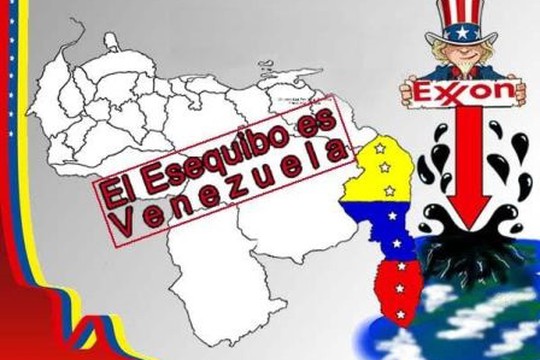Pic.: mpppst.gob.ve
On December 3, 2023, a large number of registered voters in Venezuela voted in a referendum over the Essequibo region that is disputed with neighboring Guyana. Nearly all those who voted answered ‘yes’ to the five questions. These questions asked the Venezuelan people to affirm the sovereignty of their country over Essequibo.
“Today,” said Venezuelan President Nicolas Maduro, “there are no winners or losers.” The only winner, he said, is Venezuela’s sovereignty. The principal loser, Maduro said, is ExxonMobil.
In 2022, ExxonMobil made a profit of $55.7 billion, making it one of the world’s richest and most powerful oil companies, notes Vijay Prashad, the Director of Tricontinental Institute for Social Research, and co-author to famous philosopher Noam Chomsky.
Companies such as ExxonMobil, exercise an inordinate power over the world economy and over countries that have oil reserves. It has tentacles across the world, from Malaysia to Argentina. In his Private Empire: ExxonMobil and American Power (2012), Steve Coll describes how the company is a “corporate state within the American state.”
Walking through the various polling centers in Caracas on the day of the election, it was clear that the people who voted knew exactly what they were voting for: not so much against the people of Guyana, a country with a population of just over 800,000, but they were voting for Venezuelan sovereignty against companies such as ExxonMobil. The atmosphere in this vote — although sometimes inflected with Venezuelan patriotism—was more about the desire to remove the influence of multinational corporations and to allow the peoples of South America to solve their disputes and divide their riches among themselves.
When Hugo Chávez won the election to the presidency of Venezuela in 1998, he said almost immediately that the resources of the country — mostly the oil, which finances the country’s social development — must be in the hands of the people and not oil companies such as ExxonMobil. “El petroleo es nuestro” (the oil is ours), was the slogan of the day. From 2006, Chávez’s government began a cycle of nationalizations, with oil at the center (oil had been nationalized in the 1970s, then privatized again two decades later). Most multinational oil companies accepted the new laws for the regulation of the oil industry, but two refused: ConocoPhillips and ExxonMobil. Both companies demanded tens of billions of dollars in compensation, although the International Center for Settlement of Investment Disputes (ICSID) found in 2014 that Venezuela only needed to pay ExxonMobile $1.6 billion.
In 2015, ExxonMobil announced that it had found 295 feet of “high-quality oil-bearing sandstone reservoirs”; this is one of the largest oil finds in recent years. The giant oil company began regular consultation with the Guyanese government, including pledges to finance any and every upfront cost for the oil exploration. When the Production Sharing Agreement between Guyana’s government and ExxonMobil was leaked, it revealed how poorly Guyana fared in the negotiations. ExxonMobil was given 75 percent of the oil revenue toward cost recovery, with the rest shared 50-50 with Guyana; the oil company, in turn, is exempt from any taxes.
Even worse for Guyana is that the deal is made in waters disputed with Venezuela since the 19th century.
The December 3 referendum in Venezuela and the “circles of unity” protest in Guyana suggest a hardening of the stance of both countries.
War does not seem to be on the horizon. The United States has withdrawn part of its blockade on Venezuela’s oil industry, allowing Chevron to restart several oil projects in the Orinoco Belt and in Lake Maracaibo. Washington does not have the appetite to deepen its conflict with Venezuela. But ExxonMobil does. Neither the Venezuelan nor the Guyanese people will benefit from ExxonMobil’s political intervention in the region. That is why so many Venezuelans who came to cast their vote on December 3 saw this less as a conflict between Venezuela and Guyana and more as a conflict between ExxonMobil and the people of these two South American countries.
read more in our Telegram-channel https://t.me/The_International_Affairs

 10:22 09.12.2023 •
10:22 09.12.2023 •























